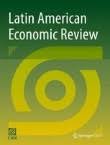
Lo más reciente
This paper estimates the marginal treatment effect of formality on wages for Brazil at the individual level leveraging regional data on labor inspections for identification. The results show that there is significant essential heterogeneity among otherwise identical workers that lead them to self-select into the type of jobs, formal or informal, that better reward their skills. The Average Treatment Effect (ATE) is 22%, but not statistically different from zero. But there are individuals with very low non-observed costs of formality that can earn premiums of up to 100% of their wage from being formal and workers who would be hurt if they switch from informality to formality as they experience very high non-observed costs of being formal. Two policy experiments in which we tighten enforcement of the labor law via hiring more labor inspectors increase the likelihood of workers being formal, but it has, on average, a negative effect on wages for the workers who are induced to switch from informality to formality.
